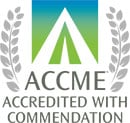Continuing Medical Education (CME)
Accreditation Statement

The American Association for Cancer Research (AACR) is accredited by the Accreditation Council for Continuing Medical Education (ACCME) to provide continuing medical education activities for physicians.
Credit Designation Statement
AACR has designated this live activity for a maximum of 18.0 AMA PRA Category 1 Credit(s)™. Physicians should only claim credit commensurate with the extent of their participation in the activity.
Credit certification for individual sessions may vary, dependent upon compliance with the ACCME Accreditation Criteria. The final number of credits may vary from the maximum number indicated above.
Claiming (CME) Credit
CME credit is available for in-person attendance for the designated sessions. On-demand presentations are not eligible for CME.
Physicians and other health care professionals seeking AMA PRA Category 1 Credit(s)TM for this live continuing medical education activity must complete the online CME Request for Credit Survey by November 2, 2022. Certificates will only be issued to those who complete the survey. Your CME certificate will be sent to you via email after the completion of the activity.

Successful completion of this CME activity, which includes participation in the evaluation component, enables the participant to earn up to 18.0 Medical Knowledge MOC in the American Board of Internal Medicine’s (ABIM) Maintenance of Certification (MOC) program. Participants will earn MOC points equivalent to the amount of CME credits claimed for the activity. It is the CME activity provider’s responsibility to submit participant completion information to ACCME for the purpose of granting ABIM MOC credit.
To receive ABIM MOC, participants must request MOC in the CME Request for Credit Survey and complete all questions. Once these steps are completed, AACR will submit your completion information via the ACCME’s Program and Activity Reporting System for the purpose of granting MOC points.
Statement of Educational Need, Target Audience, and Learning Objectives
Racial and ethnic disparities in cancer rates are well documented. Research shows that individuals from racial/ethnic minority and medically underserved populations are more likely to be diagnosed with late-stage diseases that might have been treated more effectively or cured if diagnosed earlier. For example, the rate of new cancer cases in the US is highest among black men, followed by white, Hispanic, Asian/Pacific Islander, and American Indian/Alaska Native men. In comparison, for women, the rate of new cancer cases is highest among white women, followed by black, Hispanic, Asian/Pacific Islander, and American Indian/Alaska Native women. Death rates are highest among black women and men, followed by white, American Indian/Alaska Native, Hispanic, and Asian/Pacific Islander women and men. In populations such as the LGBTQ+ community, there is not enough research available to truly assess the impact of disparities on health and the incidence of cancer. Similar trends are seen in young populations, particularly children.
Recent events have highlighted the pervasive nature of health disparities, and data suggest that biological and social determinants contribute to disparities across the cancer continuum. Cultural beliefs, as well as financial and physical barriers are some of the issues that prevent individuals or groups from obtaining effective health care. However, other factors also play a major role. Among these factors are the genetic contribution to the incidence of certain cancers and cancer disparities, availability of effective interventions tailored to specific communities, the role of lifestyle and environmental factors in cancer risk in underserved populations, and tumor subtypes within racial/ethnic groups. Differences between populations regarding prevention, diagnosis, treatment, survivorship, screening guidelines, and access to multi-level interventions all play various roles in the risk, treatment, and survival of individuals in medically underserved populations.
To reduce the burden of cancer due to health disparities, there is a need to educate physicians on the role of the various factors involved in creating health disparities and how they impact the diagnosis, treatment, response, and survival of cancer patients from racial/ethnic minorities and medically underserved populations. This conference will bring together a wide range of physicians, scientists, health professionals, and health care leaders to discuss the latest findings in their fields, to foster collaborative interdisciplinary interactions and partnerships, and to stimulate the development of new research and clinical practices aimed to reduce cancer health disparities and provide the most appropriate care for a diverse patient population.
After participating in this CME activity, physicians should be able to:
- Develop novel approaches to increasing participation of underrepresented communities in clinical cancer research
- Allow clinicians to recognize and address unconscious bias in patient care to more equitably provide treatment to minority and underserved patients and communities.
- Allow physicians to identify how cancer health disparities affects patients along the cancer continuum and use this knowledge to improve access and recommend more effective therapies to patients from underserved communities.
- Improve how clinicians diagnose disease in underrepresented and underserved patients
- Identify the financial and physical barriers that prevent individuals and groups from obtaining effective health care
Disclosure Statement
It is the policy of the AACR that the information presented at AACR CME activities will be unbiased and based on scientific evidence. To help participants make judgments about the presence of bias, AACR will provide information that Scientific Program Committee members and speakers have disclosed all financial relationships they have with ineligible companies whose primary business is producing, marketing, selling, re-selling, or distributing healthcare products or services used by or on patients. All of the relevant financial relationships for these individuals have been mitigated.
Acknowledgment of Financial or Other Support
The AACR gratefully acknowledges the following commercial supporters:
PROFESSIONAL EDUCATION GRANTS
- BMS
- Gilead
- GSK
- Lilly
- Novacure
- Pfizer
Questions about CME?
Please read our frequently asked questions. If you still have questions, please contact the Office of CME at (215) 440-9300 or [email protected].
